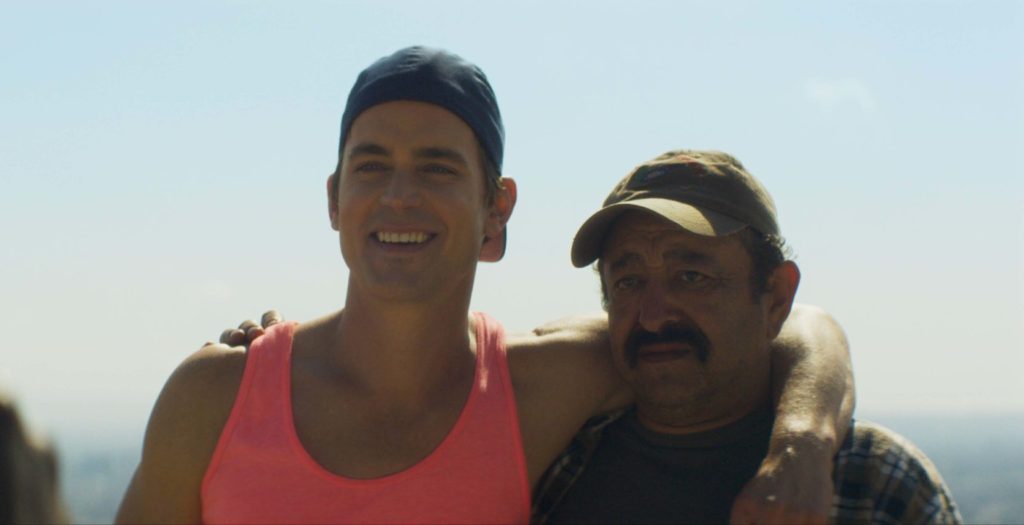- Culture
- 20 Jun 19

What happens when you fall apart in public and your masculinity is left hanging in the wind? That’s the question Irish film-maker John Butler sets out to answer in his new LA-set character study, Papi Chulo.
“Whenever I’d come back to Europe from L.A., everyone would ask me ‘Isn’t it just a vast and vapid concrete jungle that’s totally soulless, and you have to drive everywhere?’ And of course all of those things are partly true!” laughs director John Butler, who spent some of his formative years in Los Angeles, and now spends about half his time there.
“But there’s another side to the city that’s so interesting. It has beautiful nature, and it’s very atmospheric and haunted. Los Angeles brings that melancholy out in people, just because you can create vast distances between people because of the vast size. So it’s the perfect place to create a story about bridging divides.”
This idea of Los Angeles as a haunted psychosphere is a huge part of Butler’s new film, Papi Chulo. It is a tender and layered comedy about local L.A. weatherman Sean (a brilliant Matt Bomer) struggling to cope with the end of a relationship. After crying on-air, Sean’s personal pain suddenly becomes very public. Of course, the video of his breakdown goes viral.
“I thought it was such an interesting place to start, seeing someone break like that, and so publicly,” says Butler, who adds that: “One of my greatest fears is that I’m going to wet myself onstage. It’s that subconscious idea of a loss of control, that’s how it manifests for me. One of my friends has it about crying. It’s about control. It is that fear of the gap between our public selves and our vulnerable selves.”
Sean’s colleagues insist he takes time off work – one of those suggestions that sounds supportive, but is also a way of ensuring they don’t actually have to deal with him.
Advertisement
“’You need to talk to someone’ is something you hear far more often than people actually offering to be the person you talk to,” remarks Butler, dryly.
When Sean hires Mexican labourer Ernesto (Alejandro Patino), he finds emotional freedom in Ernesto’s kindness – even if Ernesto doesn’t understand every word. There are also cultural differences between them; of class, race, sexuality and privilege, all subtly addressed within the film. Despite recent bigotry, Butler wasn’t trying to make a political point through this tale of unlikely friendship.
“It was written before Forty-Five was elected – not that these issues don’t pre-date this presidency, but they’ve been thrown into a sharper focus. I really just approached it about these two characters. But if there’s more prescience now and it starts conversations, that’s obviously good.”
It’s also important to Butler that Irish filmmakers get the opportunity to tell these diverse stories.
“The scope of Irish storytelling is broadening, and creative talent is what makes something Irish. It’s encouraging to see the different ways we can be Irish storytellers; it’s not always about Ireland. Lenny Abrahamson’s Room was a perfect example of that, and Paddy Breathnach’s Viva.”

For Butler, whose films The Stag and Handsome Devil also examined male friendships, his process is driven by emotion, exploration and empathy.
Advertisement
“All the films I’ve done feel like manifestations of a question, rather than an answer,” he muses. “I don’t always know what the question is, but I know it has something to do with platonic male friendship between queer people and straight people, people who have been othered, people from different circumstances - the tension there fascinates me. There’s something about men and their bullshit which never ceases to fascinate me.”
Butler’s films push our understanding of diverse male experiences. One example is when Sean takes Ernesto to a party of his gay friends – his family in a lonely city.
“It was very important to me that Sean’s logical family was composed of gay people in a higher age bracket than you normally see at gay parties onscreen – survivors, in a sense,” Butler explains. “Not only of HIV and AIDs but also the various unjust administrations in the US. His family have come through all that together. So that they’d be older and diverse was really important to me, because I think that’s a story that’s undertold in our community. Queer stories about people who aren’t young are still quite rare. So I had to go into my Rolodex and hit up all the Los Angeles bears that I knew!” he quips.
On that topic, the film also features a Grindr connection that confounds our expectations of what dating and hook-up apps offer.
“Apps are often portrayed as being one hundred percent transactional,” says Butler, “and certainly that’s available if you want it, but I think you bring a set of assumptions into your life on the apps, and they’re met – and sometimes confounded. And you can make great friendships on the apps from encounters that may be sexual and evolve into something else, or maybe aren’t sexual. I still have great friends that I found on the apps. I don’t think we acknowledge that, and so end up perpetuating the transactional reputation.”
Though having lived in London and Los Angeles, Butler also notes that Irish people have necessarily developed far better app-etiquette than people in larger cities.
“Ireland has a great LGBTQ community, in part because it’s so localised. If you flame-block someone on the apps on Wednesday, it’s very likely you’ll run into them – on the Thursday, probably!”
Advertisement
• Papi Chulo is in cinemas now.










